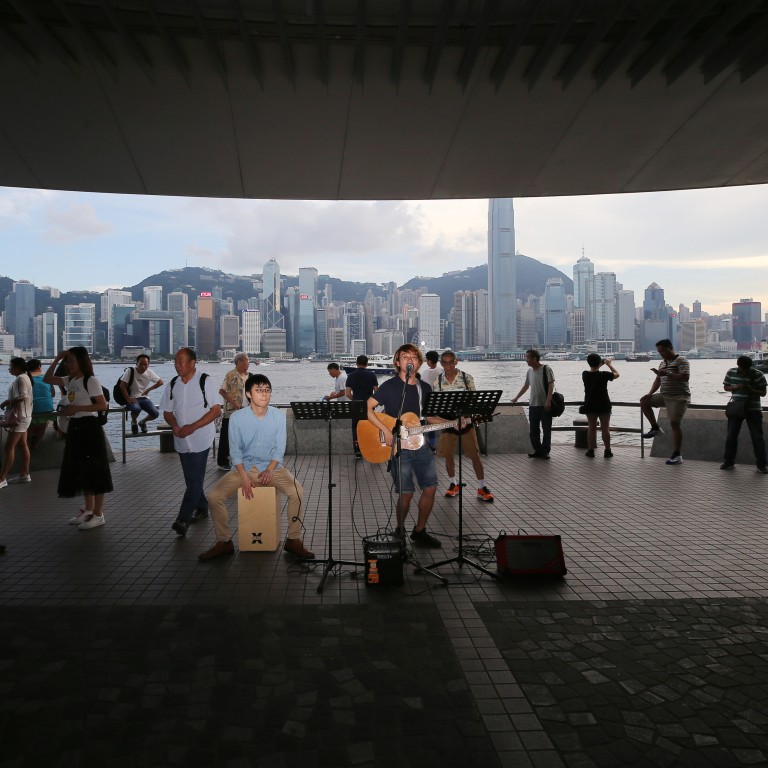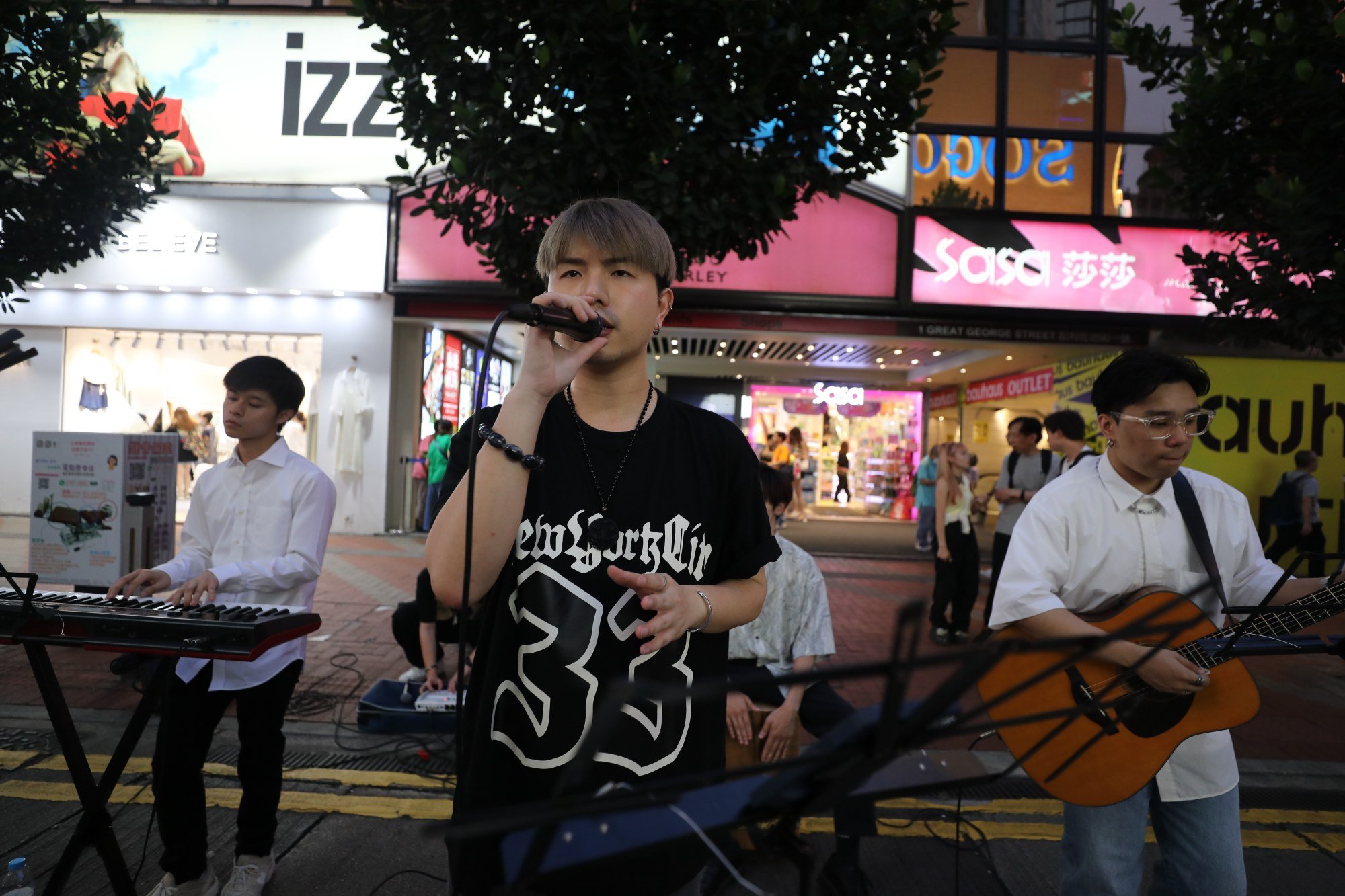
Busking blues: Hong Kong street performers hope for better times, bigger crowds, but rules still get in the way
- Thin crowds since pandemic leave buskers wishing they had more freedom to choose when, where to perform
- Performers say they must end early to avoid noise complaints and city’s ambitions to revive nightlife must consider buskers
At a recent Friday night gig in the heart of Hong Kong’s bustling Causeway Bay shopping district, busker Jay Lee Kwun-kit sang to a thin gathering of fewer than 30 people.
Back in 2018, before the city was hit by social unrest and then the Covid-19 pandemic, he performed regularly at the same spot on East Point Road and had no trouble attracting 200 people, sometimes even 1,000.
At the time buskers also competed for limited spots to perform, sometimes having to negotiate among themselves when they stood too close to one another.

“Busking was quite a scene back then. But sentiments towards busking have changed. Maybe the social-distancing measures have trained people subconsciously to avoid gatherings,” said Lee, 34.
The scene may pick up once more after a government pledge to boost the night economy and post-pandemic recovery, with city leader John Lee Ka-chiu to unveil the first series of activities around the Mid-Autumn Festival on September 29 and the National Day holiday on October 1 and 2.
Businesses welcomed the move and large developers such as New World Development and Henderson Land have promised more nighttime activities in their shopping centres, including live performances.
Buskers interviewed by the Post were confident that street performances would increase foot traffic but said performers needed more than access to free spaces.
‘Create a mood’: Hong Kong hopes to turn night markets into magnets with bazaars
They hoped the rules on where and when they were allowed to perform could be amended to draw bigger crowds.
“Street performances can definitely make people go out of their homes, just take a look at the audiences we drew before,” said Lee, who used to perform three to four times per week, doing sessions of up to four hours.
Agreeing, lawmaker Kenneth Leung Yuk-wai recalled a recent trip to Guangzhou’s Haixinsha Park, where young people gathered at night for outdoor activities, including film screenings and live performances.
“The park has become a living circle that appeals to many. As long as people come out, they will spend,” he said.
The West Kowloon Cultural District, the city’s arts hub envisioned as a regional cultural jewel, is counting on street performances to add buzz and attract visitors.

The district authority has picked 30 groups for street performances at two designated spaces within the M+ contemporary art museum, the Hong Kong Palace Museum and two waterfront locations starting in early September.
Buskers can also apply for a permit to secure a spot and time for their performance at various places in the city, but must do so 14 days in advance.
The outdoor area of the Sha Tin Town Hall and the six new “Harbourfront Shared Spaces” that come under the Development Bureau, however, are open to buskers permit-free.
But Lee was not convinced. “The permit system goes against the spirit of busking,” he said.
Spontaneity and improvisation were the essence of busking but both were compromised by the restrictions of the permit scheme, he said.
The night is young? Call for longer Hong Kong mall hours, vouchers for late shoppers
For example, his permit to perform at Causeway Bay only allowed him to be there from 7pm to 9pm, provided there were no noise complaints from nearby residents.
“But isn’t 9pm the starting point for the night economy? But still, it is better to have a permit because if you don’t, you will be asked to leave immediately,” he said.
According to police’s permit hotline, performance times varied depending on locations and usually cut off at 9pm for spots in busy business sites close to residential areas.
Streets packed with pedestrians, such as those in Mong Kok, Tsim Sha Tsui and Causeway Bay, usually have flats and hotels too.
Lee suggested a licence scheme that would let buskers perform for a longer time and free them to choose spots more suited to their performances.
Taiwan and Japan had such a system, with buskers choosing from a list of locations and times agreed upon jointly by authorities and performers, so they did not have to apply for a permit before every gig.

Judas Law Hoi-ling, 29, who began performing as a busker in 2016 and has 41,000 fans on Instagram, said that although it was easier to find a spot these days, the free spaces were not attractive enough.
“Experienced buskers with a solid fan base would not choose these designated places as the places are quiet and have similar environment features, lacking variety for different kinds of buskers,” she said.
A check of three of the six harbourfront shared spaces – Wan Chai’s HarbourChill, the Water Sports and Recreation Precinct and Causeway Bay’s Revitalised Typhoon Shelter Precinct – found no busking and few pedestrians on a recent weekday night.
Both buskers interviewed said that in the discussion on livening the night scene, the authorities had not considered ways to support the buskers themselves.
“What are the benefits to buskers except from being given a secured place to perform? Are we allowed to collect donations from audiences?” Lee said.
Under Hong Kong law, street performers cannot receive rewards from their audience at the risk of being regarded as begging on the street and told to leave.
“After all, the arts come with a price and buskers, especially full-time ones, need to survive,” Lee said.

